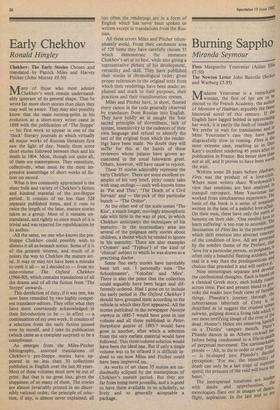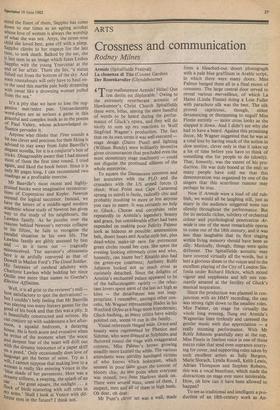Burning Sappho
Miranda Seymour
Madame Yourcenar is a remarkable woman, the first of her sex to be elected to the French Academy, the author of Memoirs of Hadrian, arguably the finest historical novel of this century. If the English have lagged behind in appreciating her work, it is partly the fault of insularitY. We prefer to wait for translations and in Mme Yourcenar's case they have been disgracefully slow in coming. Fires is the most extreme case, reaching us in D°1.1 Katz's excellent rendering 45 years after Its publication in France. But better slow than not at all, and it proves to have been wort" the wait. Written some 20 years before Hadrian, Fires was the product of a love-crisis; Where most writers share Wordsworth s view that emotions are best analysed 1°, tranquil retrospect, Mme Yourcenar 113' worked from simultaneous experience. The basis of the book is a series of notations written in the heat of a painful love-affair; On their own, these have only the merit of honesty on their side. 'One needed love t° learn suffering' is too true to astonish. The fascination of Fires lies in the prose-P°eIT which shift emotion into abstract concepts of the condition of love. All are governeut by the sombre theme of the Preface, th `love for a particular person, so poignant s t often only a beautiful fleeting accident, lesd real i in a way than the predispositions n-11, choices that preceded it and will outlive t. Nine monologues separate and devell the confessional thoughts. Each is based a classical Greek story, each boldly roar°, across time. Past and present blend to pr.°, yoke the reader into fresh views of far11111,3e things. Phaedra's journey through 0'0 subterranean labyrinth of Crete Is so described as to suggest the crushed orba subway, gulping down a living tide witich,l,. our most terrifying image of the river of dead. Homer's Helen sits smearing iipstic,s on a Thirties' vampire mouth. Plat° Phaedo dances in an Athens cocktail ," before being condemned to a life-inde1:13atft of perpetual movement. The unremarkable pensee — `Ah, to die in order to stop TIT - is re-shaped into Phaedo's dazzle", perception: Tor me, the immobility o'_ death can only be a last stage of suPreille speeaerdt.;, the pressure of the void will burst 01Y h lea The interspersed notations are d!: with doubt and apprehension; the with flare out in images of dance' flight, aspiration. In the last and to lnY mind the finest of them, Sappho has come down to our times as an ageing acrobat whose love of women is always the worship of what she was not. Attys, the street-wise child she loved best, goes off with a pimp. Sappho climbs to her trapeze for the last time, to seek death. Balked by the net, she is last seen in an image which fuses Lesbos Sappho with the young Yourcenar at the end of her affair. There she lies, 'a statue fished out from the bottom of the sky. And soon roustabouts will only have to haul on- to the sand this marble pale body streaming with sweat like a drowning woman pulled from the sea.'
It's a pity that we have to lose the sug- gestive mer/mere pun. Untranslatable word-plays are as serious a game in this graceful and complex book as in the poems of Paul Valery, whose acknowledged in- fluence pervades it.
Anyone who thinks that Fires sounds a bit too clever and precious for their liking is advised to stay away from John Banville's elegant novella, for it is a conjuror's box of tricks. Disagreeably aware that I had missed most of them the first time round, I tried again, and liked the book better. Since it is Only 80 pages long, I can recommend two readings as a profitable exercise.
Mr Banville's most recent and highly- praised books were imaginative reconstruc- tions of Copernicus and Kepler. Newton have the logical successor. Instead, we nave the letters of a middle-aged modern academic whose study of Newton has given Way to the study of his neighbours, the Lawless family. As he puzzles over the reasons behind Newton's nervous collapse in his fifties, he fails to recognise the Parallel situation in his own life. The Lawless family are glibly assessed by him and — as it turns out — tragically misconceived. The narrator's obtuseness here is as artfully conveyed as that of Dowell in Madox Ford's The Good Soldier. His fantasies of cerebral adultery with Charlotte Lawless while bedding her niece Ottilie owe more than names to Goethe's Elective Affinities.
Well, it is all grist to the reviewer's mill — but satisfactory to spot the derivations! — Out I couldn't help feeling that Mr Banville Was Playing too many literary games for the Food of his book and that this was a pity. It Is beautifully constructed and written. He can conjure up with suddenness a hot after- kn°011, a squalid bedroom, a decaying ruse. He is both acute and evocative when he writes of the moment when 'the worst and deepest fear of the heart will drift out with the dreamy innocence of a paper skiff ;1 a pond.' Only occasionally does love of language get the better of sense. Try as I I cannot suppose that making love to a woman is really like entering Venice in the dreamy shade of her pavements. Here was a 1•_realny stillness, a swaying, the splash of an
oar the great square, the sunlight ... a flock of birds scattering with soft cries in mY arms.' Shall I look at Venice with dif- ferent eyes in the future? I think not.





































 Previous page
Previous page